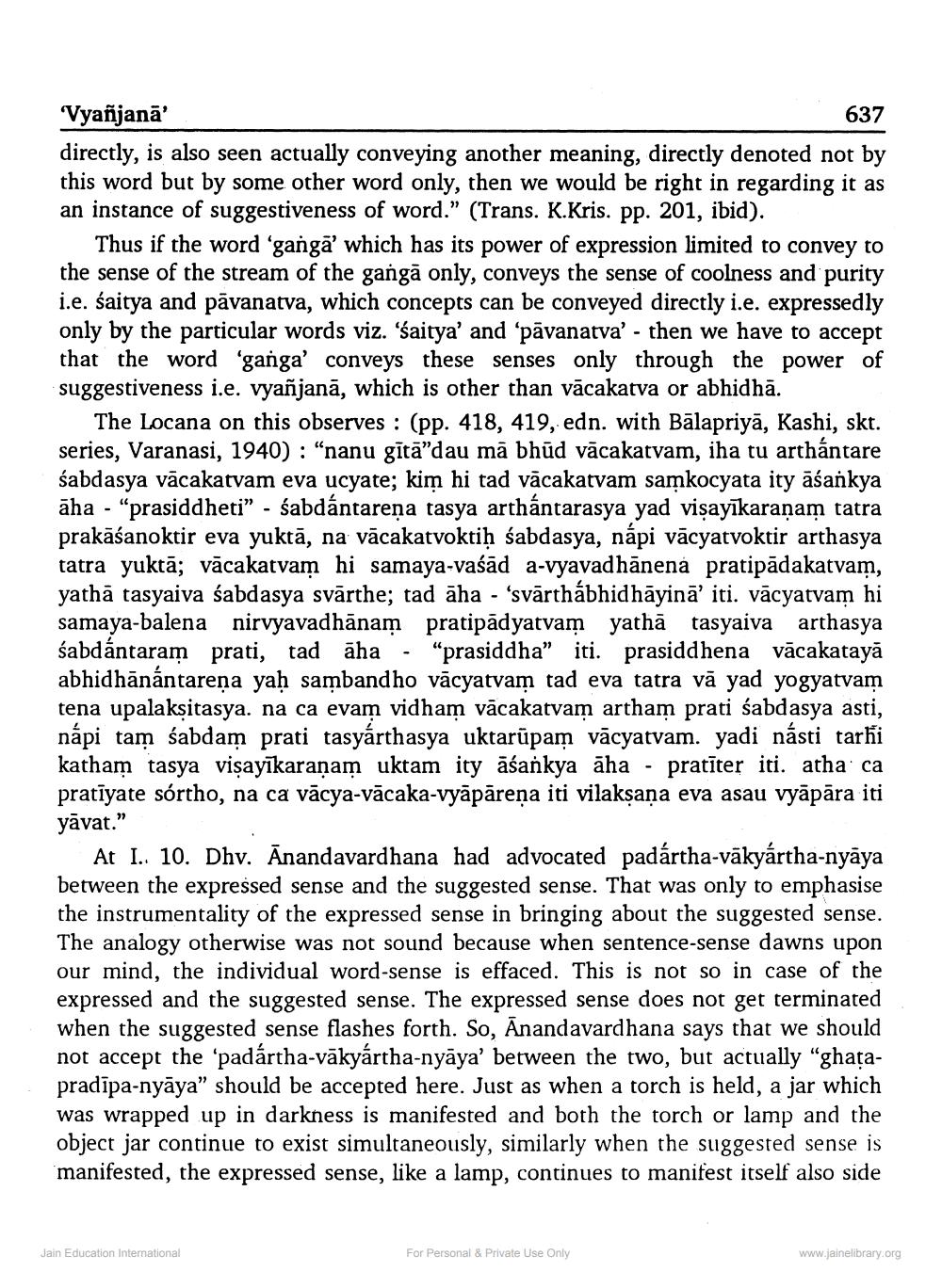________________
637
Vyañjana' directly, is also seen actually conveying another meaning, directly denoted not by this word but by some other word only, then we would be right in regarding it as an instance of suggestiveness of word.” (Trans. K.Kris. pp. 201, ibid).
Thus if the word 'gangā which has its power of expression limited to convey to the sense of the stream of the gangā only, conveys the sense of coolness and purity i.e. śaitya and pāvanatva, which concepts can be conveyed directly i.e. expressedly only by the particular words viz. 'śaitya' and 'pāvanatva' - then we have to accept that the word 'ganga' conveys these senses only through the power of suggestiveness i.e. vyañjanā, which is other than vācakatva or abhidhā.
The Locana on this observes : (pp. 418, 419, edn. with Bālapriyā, Kashi, skt. series, Varanasi, 1940) : “nanu gītā”dau mā bhūd vācakatvam, iha tu arthántare śabdasya vācakatvam eva ucyate; kim hi tad vācakatvam samkocyata ity āśankya āha - "prasiddheti” - śabdántarena tasya arthántarasya yad visayîkaranam tatra prakāśanoktir eva yuktā, na vācakarvoktiḥ śabdasya, nápi vācyatvoktir arthasya tatra yuktā; vācakatvam hi samaya-vaśād a-vyavadhānená pratipādakatvam, yathā tasyaiva sabdasya svārthe; tad āha - 'svārthábhidhāyinā' iti. vācyatvam hi samaya-balena nirvyavadhānam pratipadyatvam yathā tasyaiva arthasya śabdántaram prati, tad āha - "prasiddha" iti. prasiddhena vācakatayā abhidhānántarena yah sambandho vācyatvam tad eva tatra vā yad yogyatvam tena upalaksitasya. na ca evam vidham vācakatvam artham prati śabdasya asti, nápi tam śabdam prati tasyárthasya uktarūpam vācyatvam. yadi násti tarki katham tasya vișayīkaranam uktam ity āśankya āha - pratīter iti. atha ca pratīyate sórtho, na ca vācya-vācaka-vyāpāreņa iti vilaksana eva asau vyāpāra iti
yāvat.”
At I.. 10. Dhv. Anandavardhana had advocated padártha-vākyártha-nyāya between the expressed sense and the suggested sense. That was only to emphasise the instrumentality of the expressed sense in bringing about the suggested sense. The analogy otherwise was not sound because when sentence-sense dawns upon our mind, the individual word-sense is effaced. This is not so in case of the expressed and the suggested sense. The expressed sense does not get terminated when the suggested sense flashes forth. So, Anandavardhana says that we should not accept the 'padártha-vākyártha-nyāya' between the two, but actually “ghatapradīpa-nyāya" should be accepted here. Just as when a torch is held, a jar which was wrapped up in darkness is manifested and both the torch or lamp and the object jar continue to exist simultaneously, similarly when the suggested sense is manifested, the expressed sense, like a lamp, continues to manifest itself also side
Jain Education Interational
For Personal & Private Use Only
www.jainelibrary.org




